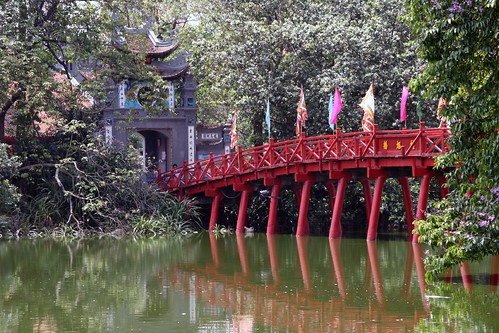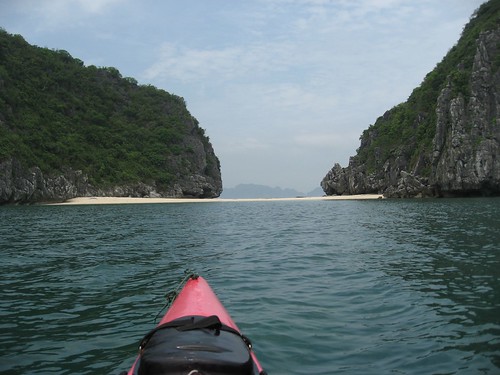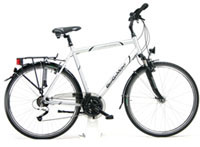Day 49-56: Entering China
Monday, May 21th, at 6:45 I was at the Chinese embassy for the third time to apply for the Chinese visa. When I parked my bicycle I looked up to see that even though I had arrived one hour and forty-five minutes before the embassy would open, I was still not the first applicant in line. Six other troupers had made it before me. Standing in line ahead of me was two Dutch fellows and one French woman teaching law in Hanoi. I scared them with my stories of previous experiences with the embassy and filled in with other rumours I had picked up speaking to other travellers in the last weeks. Nervous and anxious we filled out our forms in line and waited patiently. Two hours later we all had managed to turn in our applications before closing. Excited we met outside the tall, yellow brick walls of the embassy and agreed to celebrate with a deluxe French breakfast.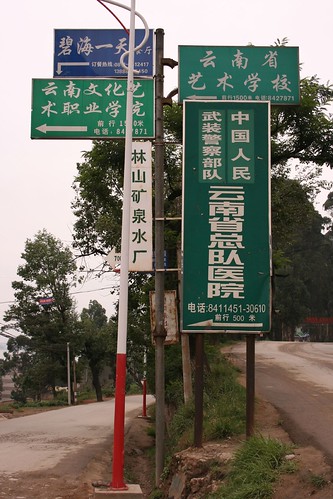
Leaving Vietnam I felt relieved. I had spent 50 days in this country and I was ready for something new. The day half my journey was completed, I was on my way to China, feeling excited about what awaited ahead. Many questions lingered in my mind. Would I be greeted in the same friendly manner I had been in Vietnam? Could I easily stop for food and drinks? What would the road conditions be like? What about safety? However, walking with my bicycle across the bridge that connects China with Vietnam, seeing China appearing closer and closer, I realized that this was a new beginning. I had to start over, getting to know the people, the culture, the language, and learning new phrases. It was the same questions I had had when entering Vietnam and it all had worked out perfectly. I was very content with my travels and experiences in Vietnam. Now I was in Hekou, the city that lies on the border to Vietnam, cycling around town, absorbing the new environment. Everywhere were Chinese characters in all shapes and sizes, covering every entrance of every store or restaurant. People stared differently, and I was not receiving the smiles I was used to. I figured the citizens of Hekou were not accustomed to a foreigner cruising around the streets on a fully loaded bicycle. They were probably in chock, unable to display any emotions. It was a very hot day. The locals were hiding under umbrellas, drinking refreshing cocktails and juices. In an attempt to escape the burning mid-day sun I joined them to try out some Chinese refreshing drinks. When my coconut juice was place in front of me two Japanese men sat down at my table, curious about my bicycle and travels. After I had presented my situation and explained my ambitions, I curiously asked what brought them to Hekou, in the very south of China, next to the Vietnamese border. In my mind, the reason for being here was merely for transport purposes. Either you were on your way to Vietnam, crossing over the border, or you just left the country on your way to other destinations in China. It never entirely became clear to me why the Japanese tourists were in Hekou, but they logically explained to me that the Vietnamese girls are very pretty and affordably this close to the border. That clarified the dildos that were being sold at the market among fruits, vegetables and meats.
The night bus to Kunming reminded me of a similar bus me and Daniel had taken going to Hanoi. This time, however, there were no air-conditioning, and it was packed with Chinese people, wondering what I was doing on their bus. When I finally entered a deep sleep the bus arrived, ending a nightmare about Chinese people stealing my bicycle. At 4:30 in the morning I stepped out of the bus, equipped myself with my head-lamp, assembled the bicycle, and venture into the dark city. More than half my journey had passed so I thought it was time for a bit of luxury, checking into a finer hotel at four times the cost I had been paying in my last days in Vietnam. I needed to get prepared for China and get a good night sleep before pedalling west towards Dali, about 420 kilometers away. I had spent the last two nights either on a train or bus, thus I took the opportunity to indulge in a hot bath, buffet breakfast and English TV. Kunming is a modern city with rising skyscrapers, western clothing stores, food chains, structured roads, traffic lights and even bicycle lanes. When I was not at the hotel, appreciating the luxurious comfort, I cycled around Kunming, visiting the main attractions. I also managed to stop by a professional bicycle store to get my bicycle perfectly tuned up for the challenges ahead.
I left Kunming fully dressed in my wind protecting outfit as the temperatures drop down below ten degrees Celsius in the early morning. Kunming is located at an altitude of almost 1900 meters, making it especially chilly in the first hours of the day. From this day on I would not ascend below 1000 meters for a few weeks, so my warmer clothes would soon come handy. I was not only excited to use the gear I had been carrying all the way through Vietnam, I was also pleased with a cooler climate that would prevent me from sweating uncontrollably. Sadly, my first impression of cycling in China was disappointing. Leaving Kunming I travelled through the backside of the city, next to factories and old dump yards. The heavy traffic, with exclusively large, old trucks leaving thick black smoke behind them, did not improve my belief. Not until I arrived in Anning, 30 kilometers south-west of Kunming, did the traffic disperse. Although I was still full from the enormous buffet breakfast I had truly enjoyed a couple of hour ago, I stopped in town for my first Chinese meal on the road. I picked a place full of people eating and having loud conversations, and instantly I was invited to join a table of four. As I thankfully seated myself an English teacher was called over from another table to translate our dialogue. After a good meal and pleasant company, I illustratively displayed my appreciation and asked for the bill, but the English teacher had already cleared the costs and despite my protests, he insisted on paying for my lunch. I left the restaurant with a dramatically changed first impression of cycling in China. My destination this day was Lufeng, a city north-west of Kunming. I was not completely certain of the total distance I had to pedal since my map only display kilometres on the larger Express way where bicycles are not allowed. At 109 kilometers, travelling on the smaller road adjacent to the Express way, I was finally there, surprised of the long distance I had been required to pedal. Finding a hotel proved to be as challenging as the cycling itself. Since all sign are written in Chinese characters, it is naturally difficult for me to make out the hotels. When I ask locals they persistently speak Chinese to me, waving their hands in all direction. Every time I gesture that I do not understand, but they ignore my attempts and continue to chatter in their language. Occasionally when they see that I am not following their dialogue, they write out the Chinese characters in their hand, as if that would help me understand. Very little English is spoken outside the larger cities and apparently simple gesturing is also not practised, making communication a demanding task.
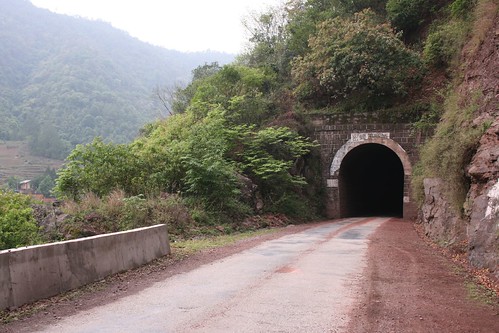 On my way to Chuxiong on my second day towards Dali, I met the second English teacher as I stopped for lunch in a small town, consisting of a dirt road and a tiny market. I was introduced to her mother, who served me a delicious meal from her bicycle. It was a custom made three-wheeler with a kitchen on the back, loaded with several different tasty dishes. This time I paid for the meal myself, but for 3 Yuan (0,30 Euro) I had it covered. After 78 kilometers I arrived in Chuxiong, a large city located roughly half-way between Kunming and Dali, and again I was faced with communication issues as I tried to find a hotel. After my forth attempt I checked in to a hotel on the east side of the city. The odd location forced me to take the bicycle back into town in search for food. Just after I parked the bicycle a man approached me, speaking good English with a hint of a British accent. He, too, was an English teacher and seemed extremely keen on practising his skills. I took the opportunity to ask questions about Chuxiong, and wondered where I could get the best Chinese dumplings in town. He explained that his Chinese name was Ping and his English Pierre, and took me to his favourite restaurant a few minutes away. Ping had spent six month in England which explained his British tone, and was truly a genuine man with the kindest soul in the world. Not only did he treat me to the dumplings and dinner, he also invited me to his home and introduced me to his family. He offered me coffee and presented me with a gift, showed me around town and took me to his school where works. After five hours I was overwhelmed by his hospitality, generosity and kindness. I thanked him and offered the same hospitality if he would ever visit Sweden. We exchanged e-mail addresses and he left me his phone number in case I would get into trouble. I wish this man all the best in the world.
On my way to Chuxiong on my second day towards Dali, I met the second English teacher as I stopped for lunch in a small town, consisting of a dirt road and a tiny market. I was introduced to her mother, who served me a delicious meal from her bicycle. It was a custom made three-wheeler with a kitchen on the back, loaded with several different tasty dishes. This time I paid for the meal myself, but for 3 Yuan (0,30 Euro) I had it covered. After 78 kilometers I arrived in Chuxiong, a large city located roughly half-way between Kunming and Dali, and again I was faced with communication issues as I tried to find a hotel. After my forth attempt I checked in to a hotel on the east side of the city. The odd location forced me to take the bicycle back into town in search for food. Just after I parked the bicycle a man approached me, speaking good English with a hint of a British accent. He, too, was an English teacher and seemed extremely keen on practising his skills. I took the opportunity to ask questions about Chuxiong, and wondered where I could get the best Chinese dumplings in town. He explained that his Chinese name was Ping and his English Pierre, and took me to his favourite restaurant a few minutes away. Ping had spent six month in England which explained his British tone, and was truly a genuine man with the kindest soul in the world. Not only did he treat me to the dumplings and dinner, he also invited me to his home and introduced me to his family. He offered me coffee and presented me with a gift, showed me around town and took me to his school where works. After five hours I was overwhelmed by his hospitality, generosity and kindness. I thanked him and offered the same hospitality if he would ever visit Sweden. We exchanged e-mail addresses and he left me his phone number in case I would get into trouble. I wish this man all the best in the world.
Ping and the two other teachers had left me with a very good feeling about China. Still, I would get very confused and sometimes harsh looks pedalling my way towards Dali. I was not receiving any friendly greetings as I used to in Vietnam, which bothered me. Then there were the dogs. In Vietnam I had a few encounters with chasing dogs but they did not pose a problem other than an annoying constant barking. They were often small and crippled. In China the dogs scared me to death. Luckily most of them were chained to a poled, functioning as a living alarm when intruders would approach. On one occasion, free-wheeling downhill, I was not so lucky. A huge German Shepard saw me approaching his territory, which apparently is the piece of road adjacent to the owner's house, and started to chase me with full force. At first I ignored him after looking down at my speedometer that showed 40 km/h, but when he appeared right behind me in a split second I got worried. The beast was in good condition, his long sharp teeth clearly on display, ready to bite anything that came near. I pushed the pedals with full power accelerating quickly up to 50 km/h, but I was not losing him. I pushed harder and harder and must have exceeded 60 km/h before the maniac animal gave up. I was slightly shaken by the incident but more so over the fact that this dog had chased me for a few hundred meters at 50 km/h. This time I was fortunate that I was on a slope, already travelling at a high speed. What if I was going my steady 20 km/h on a flat surface? He would have eaten me alive.
On the third day towards Dali I had no definite destination. There was no large city within 100 kilometers that made a logical stop. I decided to trust the road signs, and with my experience so far I would find a place to stay before making the last stretch to Dali on the forth and last day. However, following road signs in China is especially challenging due to the Chinese characters. Only close to larger cities are the names spelled out in Latin characters, making it difficult to navigate in the countryside. I would try to memorize the look of the characters to later recognize them on the road signs. Fortunately, I had picked up a map with Chinese characters in Kunming, but still I had difficulties finding my way. When asking locals I would just get instructions explained in Chinese, or at times the wrong directions. At 100 kilometer no larger town had appeared and the smaller towns I had tried to find during the day were too far from the road. I was utterly fatigued moving at creeping speed. I was not sure what slowed me down. Maybe it was the hills, the bumpy roads, the wind, the hot mid-day sun, the melting tarmac sticking to my tires, exhaustion, or a combination of all. I stopped by a small farm on the top of the mountain and asked for food, water or shelter. To my surprise and delight, I was offered all. Relieved I rolled my bicycle up the lawn and agreed to a dirty room that could substitute as a zoo for insects. I brought up my tent, assembled it on the bed, washed off and sat down among the chickens looking out over the mountains, thinking; this is assume. The family treated me like a king, preparing dinner, offering fruits and caring for me as if I was the only foreign guest that they have ever had. I most likely was.
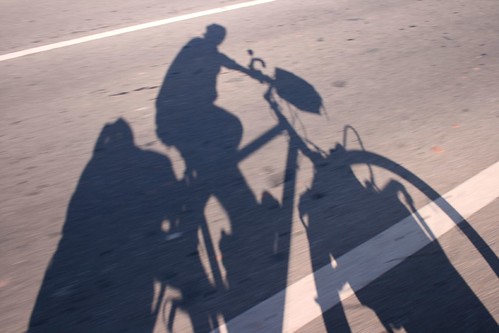 On my last day towards Dali I failed again to accurately estimate the distance, forcing me to break the long distance record, 129 kilometers. This was a long day and I did not find my way to Dali until early evening, having conquered a big mountain pass, bumpy roads, false directions, never ending construction site and the usual heat and sweat. In four days I have pedalled over 400 kilometers, pushing my physics to the limit. Now I am feeling that I am truly becoming stronger, seeing my body taking new shapes. My calves have taken abnormal proportions and despite all the food and snacks I am continuously consuming, I am still losing weight. Dali offers a variety of good foods, so now I am taking the opportunity to indulge in pancakes, fruit shakes, hamburger, cakes, and all the traditional Chinese foods without any guilt at all.
On my last day towards Dali I failed again to accurately estimate the distance, forcing me to break the long distance record, 129 kilometers. This was a long day and I did not find my way to Dali until early evening, having conquered a big mountain pass, bumpy roads, false directions, never ending construction site and the usual heat and sweat. In four days I have pedalled over 400 kilometers, pushing my physics to the limit. Now I am feeling that I am truly becoming stronger, seeing my body taking new shapes. My calves have taken abnormal proportions and despite all the food and snacks I am continuously consuming, I am still losing weight. Dali offers a variety of good foods, so now I am taking the opportunity to indulge in pancakes, fruit shakes, hamburger, cakes, and all the traditional Chinese foods without any guilt at all.
SLIDESHOW KUNMING TO DALI
Updated Route Report

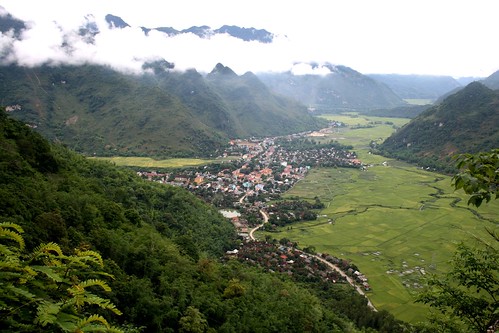 The road to Tuan Giao was expectedly hilly and I crossed one big mountain pass early in the day. Today the major challenge was not the hills or the passes; it was the condition of the road. The entire stretch was under construction, making it difficult to gain speed even when traveling downhill. By the end of the day my bicycle had become so filthy that as soon as I arrived in Tuan Giao I had it washed and polished for an astonishing 5000 Dong (0,30 Euro). From this day on I had my bicycle washed each night for the same price, and each time it would look like it did the day I rolled it out of the bicycle store in Germany where I bought it eight months ago. I was impressed by the bicycle how well it had been performing on the bumpy roads, and that it still was in one piece. Up until this day I have not had a single flat tire, broken spoke or rattling chain. My gear cables have gotten slightly stretched, making it more difficult to adjust the gears but that it is fairly normal and usually easily fixed.
The road to Tuan Giao was expectedly hilly and I crossed one big mountain pass early in the day. Today the major challenge was not the hills or the passes; it was the condition of the road. The entire stretch was under construction, making it difficult to gain speed even when traveling downhill. By the end of the day my bicycle had become so filthy that as soon as I arrived in Tuan Giao I had it washed and polished for an astonishing 5000 Dong (0,30 Euro). From this day on I had my bicycle washed each night for the same price, and each time it would look like it did the day I rolled it out of the bicycle store in Germany where I bought it eight months ago. I was impressed by the bicycle how well it had been performing on the bumpy roads, and that it still was in one piece. Up until this day I have not had a single flat tire, broken spoke or rattling chain. My gear cables have gotten slightly stretched, making it more difficult to adjust the gears but that it is fairly normal and usually easily fixed.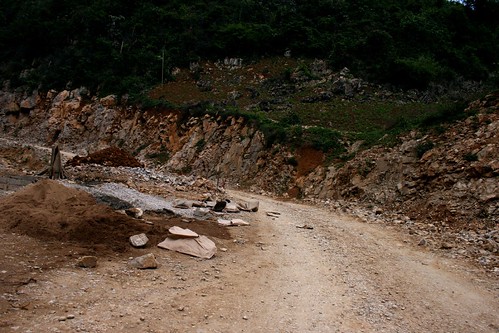 Son La appealed to me. I decided to stay here for one more resting day before pushing it to Hanoi, which would take three more days. I was not up for any sights or museums and looked forward to just relaxing and resting my legs. On my way to Son La through the mountains I had been offered some of sort of alcohol numerous times, most often rice wine, and it seemed like wherever I would sit down to eat, drink or simply rest, I would instantly have a beer or a shot glass in front of me. Most often I politely turned down the offers, repeatedly shaking my head and smile. Son La was no different. On the contrary, here people drank throughout the day. After a visit to the local market and stocking up on my favorite snacks, I sat down to enjoy a cool, refreshing sugarcane juice from one of the smaller restaurants in the center of Son La. Quickly I was surrounded by a five men, six large glasses and a few of liters of “bia”. As this was my day off I accepted their company, we raised our glasses, toasted and after an hour all bottles were empty. The men stood up, nodded, gave me a last smile and went about their business, as if this was part of their daily routine. It certainly seemed like the people of Son La had made a habit of drinking regularly. The same day, at lunch time, a group of policemen in their military green outfits with red and gold details sat down at the table next to me after finishing their midday meal. Again, I was offered alcohol with authority, but I respectfully turned down their offer, hoping that they would not arrest me for not drinking. It did not stop them, and they gladly poured down one shot after the other of rice wine, slamming the glasses hard against the table, shouting and laughing. Then, like the incident earlier in the day, they stood up, nodded and went about their business, driving off in their rusty open-air police van. Great police work, I though to myself.
Son La appealed to me. I decided to stay here for one more resting day before pushing it to Hanoi, which would take three more days. I was not up for any sights or museums and looked forward to just relaxing and resting my legs. On my way to Son La through the mountains I had been offered some of sort of alcohol numerous times, most often rice wine, and it seemed like wherever I would sit down to eat, drink or simply rest, I would instantly have a beer or a shot glass in front of me. Most often I politely turned down the offers, repeatedly shaking my head and smile. Son La was no different. On the contrary, here people drank throughout the day. After a visit to the local market and stocking up on my favorite snacks, I sat down to enjoy a cool, refreshing sugarcane juice from one of the smaller restaurants in the center of Son La. Quickly I was surrounded by a five men, six large glasses and a few of liters of “bia”. As this was my day off I accepted their company, we raised our glasses, toasted and after an hour all bottles were empty. The men stood up, nodded, gave me a last smile and went about their business, as if this was part of their daily routine. It certainly seemed like the people of Son La had made a habit of drinking regularly. The same day, at lunch time, a group of policemen in their military green outfits with red and gold details sat down at the table next to me after finishing their midday meal. Again, I was offered alcohol with authority, but I respectfully turned down their offer, hoping that they would not arrest me for not drinking. It did not stop them, and they gladly poured down one shot after the other of rice wine, slamming the glasses hard against the table, shouting and laughing. Then, like the incident earlier in the day, they stood up, nodded and went about their business, driving off in their rusty open-air police van. Great police work, I though to myself.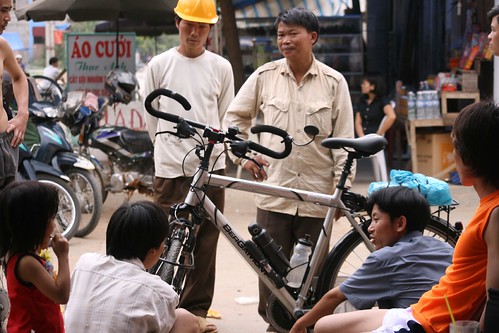 The rain was not going to stop and the last two days it more of less rained constantly. In Son La I had invested in a new poncho which covers me completely as well as most of my bicycle. It came very handy as I pedaled 117 kilometers to Hoa Binh, breaking the long distant record, and on the last day of the north-west Vietnam tour pushed the last 75 kilometers to Hanoi. It had taken me ten days to reach Hanoi from Sapa, cycling eight days, resting two. With the additional two days in Sapa it added up to twelve days, same as planned. Proud I rolled into Hanoi and the first westerner I noticed crossing the street right in front of my bicycle was the Dutch fellow I met before leaving for Sapa, and then also half way to Hanoi on one of the mountain passes. He had cycled the exact same route in the same number of days, but in the reverse direction. We laughed, shared experiences and decided to meet for a beer later that evening. I had a lot to tell and so did he.
The rain was not going to stop and the last two days it more of less rained constantly. In Son La I had invested in a new poncho which covers me completely as well as most of my bicycle. It came very handy as I pedaled 117 kilometers to Hoa Binh, breaking the long distant record, and on the last day of the north-west Vietnam tour pushed the last 75 kilometers to Hanoi. It had taken me ten days to reach Hanoi from Sapa, cycling eight days, resting two. With the additional two days in Sapa it added up to twelve days, same as planned. Proud I rolled into Hanoi and the first westerner I noticed crossing the street right in front of my bicycle was the Dutch fellow I met before leaving for Sapa, and then also half way to Hanoi on one of the mountain passes. He had cycled the exact same route in the same number of days, but in the reverse direction. We laughed, shared experiences and decided to meet for a beer later that evening. I had a lot to tell and so did he.  I was extremely excited to get back in the saddle after more than a week, heading for my next destination, Tam Duong. My first obstacle to counqer was the famous 1900 meter Tram Ton Pass, the highest mountain pass in Vietnam. Sapa is located at about 1600 meters meaning I had a relatively easy challange in front of me, a 300 meter climb. However, the road turned out to be anything but gravel, sand, rocks or at best cracked tarmac with enough potholes to send you flying across the road, partly due to road construction. It took me a good two and half hour to reach the top all while stopping to adjust my gears that had worked beautifully all the way up until now when I was crossing the greatest pass of Vietnam. 16 kilometers later all that was quickly forgotten when the road turned downhill. From here the roadwork was completed and all of a sudden I was flying down the mountain at speeds exceeding 50 km/h. The experience took me back to the central highlands and Dalat when Daniel and I left for the coast, freewheeling about twenty kilometers down the mountain. Now I was doing it again, but here the mountains are bigger, taller and stretches way beyond the horizon. More significantly, there is no traffic. The road was mine. I could hint soft layers of clouds below me, reminding me of the high altitude. Above the sun had risen over the mountains and was warming my skin in the cold but pleasant wind. Again a great feeling of happiness came over me, same as it had in Dalat, if not more prominent. Sadly, the happiness was short lived. After 20 kilometers the road turned evil as it started to climb again, and the cool wind had disappeared. This is when I fully realized what it is like pedaling in north-west Vietnam. There are no flat roads. You either fly down a mountain, or you are struggling to climb it. I also realized that it is as hot here as in south Vietnam. Furthermore, I learned that there are no rest stops along the way. Highway 1 had spoiled both me and Daniel with freuqent cafees or restaurants along the road. It was easy to stop at anytime to rehydrate or buy snacks. Here I was stuck up in a mountain with nothing but my water bottles to rely on. However, cycling up the mountain at a ten degree angle in mid-day heat (35 degree Celcius), I quickly ran out of water. Finally I approched a village with a few wooden houses. I desperately peaked in to see nothing but children looking strangely in my direction. Here was no water to be found. When I saw a woman rinsing vegetables in the creek running along the road I knew what I had to do. My water filter came to my rescue. Rehydrated I arrived in Tam Doung already after 40 kilometers, but accroding to my map it should have been at least 70. More confusingly, I saw a road sign for Lai Chau reading 30 kilometers. Lai Chau, according to my map, was more than 120 kilometers a way. What was going on? Excited to reach Lai Chau one day earlier than planned I pushed on the last 30 kilometers. I spent the evening that night repairing my gears, optimizing them for the hills. A young, ambitious man helped me making the final adjustments. He was so excited to be part of the operation that he took our picture, went to the photostore and had two copies made, one for him and one for his sister. Later I recieved a detailed drawing of a rose from him. Not sure what that meant, but he sure helped me get my bicycle ready for the next day.
I was extremely excited to get back in the saddle after more than a week, heading for my next destination, Tam Duong. My first obstacle to counqer was the famous 1900 meter Tram Ton Pass, the highest mountain pass in Vietnam. Sapa is located at about 1600 meters meaning I had a relatively easy challange in front of me, a 300 meter climb. However, the road turned out to be anything but gravel, sand, rocks or at best cracked tarmac with enough potholes to send you flying across the road, partly due to road construction. It took me a good two and half hour to reach the top all while stopping to adjust my gears that had worked beautifully all the way up until now when I was crossing the greatest pass of Vietnam. 16 kilometers later all that was quickly forgotten when the road turned downhill. From here the roadwork was completed and all of a sudden I was flying down the mountain at speeds exceeding 50 km/h. The experience took me back to the central highlands and Dalat when Daniel and I left for the coast, freewheeling about twenty kilometers down the mountain. Now I was doing it again, but here the mountains are bigger, taller and stretches way beyond the horizon. More significantly, there is no traffic. The road was mine. I could hint soft layers of clouds below me, reminding me of the high altitude. Above the sun had risen over the mountains and was warming my skin in the cold but pleasant wind. Again a great feeling of happiness came over me, same as it had in Dalat, if not more prominent. Sadly, the happiness was short lived. After 20 kilometers the road turned evil as it started to climb again, and the cool wind had disappeared. This is when I fully realized what it is like pedaling in north-west Vietnam. There are no flat roads. You either fly down a mountain, or you are struggling to climb it. I also realized that it is as hot here as in south Vietnam. Furthermore, I learned that there are no rest stops along the way. Highway 1 had spoiled both me and Daniel with freuqent cafees or restaurants along the road. It was easy to stop at anytime to rehydrate or buy snacks. Here I was stuck up in a mountain with nothing but my water bottles to rely on. However, cycling up the mountain at a ten degree angle in mid-day heat (35 degree Celcius), I quickly ran out of water. Finally I approched a village with a few wooden houses. I desperately peaked in to see nothing but children looking strangely in my direction. Here was no water to be found. When I saw a woman rinsing vegetables in the creek running along the road I knew what I had to do. My water filter came to my rescue. Rehydrated I arrived in Tam Doung already after 40 kilometers, but accroding to my map it should have been at least 70. More confusingly, I saw a road sign for Lai Chau reading 30 kilometers. Lai Chau, according to my map, was more than 120 kilometers a way. What was going on? Excited to reach Lai Chau one day earlier than planned I pushed on the last 30 kilometers. I spent the evening that night repairing my gears, optimizing them for the hills. A young, ambitious man helped me making the final adjustments. He was so excited to be part of the operation that he took our picture, went to the photostore and had two copies made, one for him and one for his sister. Later I recieved a detailed drawing of a rose from him. Not sure what that meant, but he sure helped me get my bicycle ready for the next day.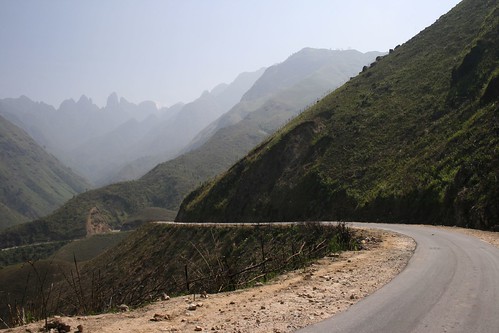 The final and third day before reaching Dien Bien Phu was going to be the most physically challenging day of my life. The last two days I had cycled 176 kilometers in extremely hilly terrain and spent almost twelwe hours in the saddle. My butt was sour, legs stiff and my body needed rest. I was not yet completely fit to handle three consecutive days in the mountains. However, I needed to reach Dien Bien Phu, 100 kilometers to the south, in order to make it to Hanoi in time. The distance was not the problem, the two mountain passes I had to climb were. I rolled out before breakfast at 5:30, a half an hour earlier than usual, wanting to cover more distance in the morning when it is cooler. The first and greatest pass came soon after I left Moung Lay, and would last much longer than I anticipated. After seven kilometers I started to feel weak (the last moutnain pass to Dalat was seven kilometers). My legs could not handle the weight of my bicycle at a ten degree slope, and were starting to give in. I pushed and pushed but every push only moved me a meter up the mountain. Finally I gave up and stepped off the bicycle. My legs felt like two single bricks attached to my hips, hurting enourmously. That was when I heard a very familiar sound; a slow moving truck traveling up the steep road. Soon I was hanging on to the truck, blessing God for his gift. After an additional seven kilometers I still had a tight grip on the truck but my arm had fallen asleep two kilometers ago. I decided to let go, waved the truck driver goodbye, and thought that this dreadful pass must be over within the next few hundred meters. To my disapointment it would continue for another five kilometers, almost ending my life. I knew I had reached the top when the truck driver awaited me by the roadside with a big, welcoming smile. We sat down on the side of the road, looking out over the mountain peaks. The wind was cool against my sweaty body and I truly felt alive. I looked over to the truck driver and with a big smile, revealing his missing teeth, he reached out a large plastic bottle with a brown, muddy liquid. Stuffed in the bottle were lots of various roots. Without a doubt I accepted his offer and took a zip. It was home-brewed sweet Vietnamese rom. He kept offering me the bottle over and over, flexing his muscles, illustrating strength, and I kept accepting his generous offers. Slightly intoxicated I rolled down on the other side of the mountain feeling like the king of the world. The rom proved to work as I pedaled effortlessly over rolling hills until I reached the second pass of the day. The story repeated itself but this time there was no truck to save me. Completely exhausted, barely alive, I reached Dien Bien Phu in the afternoon. During the entire 96 kilometers there had been only one place to stop for food, thus I had not had any lunch this day. Still I was not hungry and settle with some mangos before falling asleep at eight o'clock.
The final and third day before reaching Dien Bien Phu was going to be the most physically challenging day of my life. The last two days I had cycled 176 kilometers in extremely hilly terrain and spent almost twelwe hours in the saddle. My butt was sour, legs stiff and my body needed rest. I was not yet completely fit to handle three consecutive days in the mountains. However, I needed to reach Dien Bien Phu, 100 kilometers to the south, in order to make it to Hanoi in time. The distance was not the problem, the two mountain passes I had to climb were. I rolled out before breakfast at 5:30, a half an hour earlier than usual, wanting to cover more distance in the morning when it is cooler. The first and greatest pass came soon after I left Moung Lay, and would last much longer than I anticipated. After seven kilometers I started to feel weak (the last moutnain pass to Dalat was seven kilometers). My legs could not handle the weight of my bicycle at a ten degree slope, and were starting to give in. I pushed and pushed but every push only moved me a meter up the mountain. Finally I gave up and stepped off the bicycle. My legs felt like two single bricks attached to my hips, hurting enourmously. That was when I heard a very familiar sound; a slow moving truck traveling up the steep road. Soon I was hanging on to the truck, blessing God for his gift. After an additional seven kilometers I still had a tight grip on the truck but my arm had fallen asleep two kilometers ago. I decided to let go, waved the truck driver goodbye, and thought that this dreadful pass must be over within the next few hundred meters. To my disapointment it would continue for another five kilometers, almost ending my life. I knew I had reached the top when the truck driver awaited me by the roadside with a big, welcoming smile. We sat down on the side of the road, looking out over the mountain peaks. The wind was cool against my sweaty body and I truly felt alive. I looked over to the truck driver and with a big smile, revealing his missing teeth, he reached out a large plastic bottle with a brown, muddy liquid. Stuffed in the bottle were lots of various roots. Without a doubt I accepted his offer and took a zip. It was home-brewed sweet Vietnamese rom. He kept offering me the bottle over and over, flexing his muscles, illustrating strength, and I kept accepting his generous offers. Slightly intoxicated I rolled down on the other side of the mountain feeling like the king of the world. The rom proved to work as I pedaled effortlessly over rolling hills until I reached the second pass of the day. The story repeated itself but this time there was no truck to save me. Completely exhausted, barely alive, I reached Dien Bien Phu in the afternoon. During the entire 96 kilometers there had been only one place to stop for food, thus I had not had any lunch this day. Still I was not hungry and settle with some mangos before falling asleep at eight o'clock. 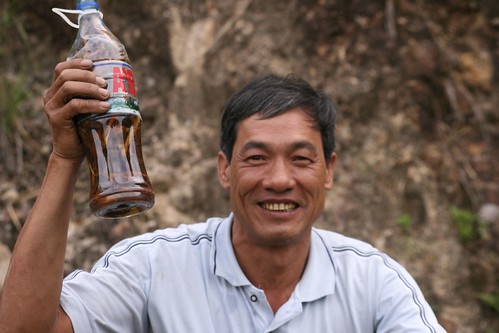
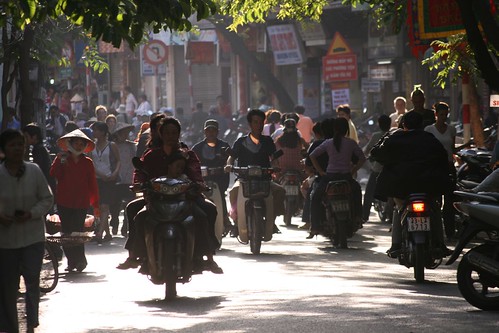 However, there was no reason to rush; I had enough time to think about alternatives. First, me and Daniel wanted to explore Hanoi, the capital of Vietnam and a city of many attractions and fascinating history. Like its southern sibling Ho Chi Minh City, Hanoi is full of vehicles in a world of chaos. Mopeds are crowding the roads in clouds of exhausts, and when not in motion, they are parked on the sidewalks, forcing pedestrians to walk through the vehicles in the streets, making it difficult for cars and taxis to move about. The result is an orchestra of honking vehicles that goes on all day, everyday. Edging the streets are countless of shops offering clothes, shoes, souvenirs, jewelry, exchange services, tours, all forms of transportations, food, drinks and more. In between the shops are restaurants and hotels in great numbers. Surprisingly, we had a tough time finding a decent hotel at a reasonable price in Hanoi. For the first time on our way from Ho Chi Minh City we had severe difficulties finding a room that suited our budget, was available and the hotel accepted our bicycles. Selecting and finding hotels has generally been effortless, as well as bringing our bicycles into the hotel, or in few occasions, our room. We never book any rooms in advance and rarely plan what hotel to pick. At few occasions there are not many options and we must accept any hotel that is available. At these times we often end up in poor rooms with no warm water, air conditioning or TV, just a warm, humid room with hard mattresses and dirty blankets. In larger towns and cities we usually scope out an area at our arrival that seems attractive, start looking at rooms and negotiate prices. Traveling on bicycles we have the luxury of easily moving quickly from one hotel to another. Thus, we take our time evaluating a number of different hotels in order to find the best room at the best price, that is, two large beds, TV with HBO, warm water, fan and air conditioning, balcony with a view, friendly staff and last but not least, good locations to park our bicycles, all under ten U.S. dollars. Being persistent in searching for good hotels and determined price negotiation, astonishingly, we have managed to get all of the above a number of times. In Hanoi history repeated itself, and after a couple of hours and a coffee break, we found a hotel in the Old Quarter area that lived up to all of our requirements, but for the additional two dollars per night. We knew we were going to stay in Hanoi for more than a week, justifying the 12 dollars for the perfect room.
However, there was no reason to rush; I had enough time to think about alternatives. First, me and Daniel wanted to explore Hanoi, the capital of Vietnam and a city of many attractions and fascinating history. Like its southern sibling Ho Chi Minh City, Hanoi is full of vehicles in a world of chaos. Mopeds are crowding the roads in clouds of exhausts, and when not in motion, they are parked on the sidewalks, forcing pedestrians to walk through the vehicles in the streets, making it difficult for cars and taxis to move about. The result is an orchestra of honking vehicles that goes on all day, everyday. Edging the streets are countless of shops offering clothes, shoes, souvenirs, jewelry, exchange services, tours, all forms of transportations, food, drinks and more. In between the shops are restaurants and hotels in great numbers. Surprisingly, we had a tough time finding a decent hotel at a reasonable price in Hanoi. For the first time on our way from Ho Chi Minh City we had severe difficulties finding a room that suited our budget, was available and the hotel accepted our bicycles. Selecting and finding hotels has generally been effortless, as well as bringing our bicycles into the hotel, or in few occasions, our room. We never book any rooms in advance and rarely plan what hotel to pick. At few occasions there are not many options and we must accept any hotel that is available. At these times we often end up in poor rooms with no warm water, air conditioning or TV, just a warm, humid room with hard mattresses and dirty blankets. In larger towns and cities we usually scope out an area at our arrival that seems attractive, start looking at rooms and negotiate prices. Traveling on bicycles we have the luxury of easily moving quickly from one hotel to another. Thus, we take our time evaluating a number of different hotels in order to find the best room at the best price, that is, two large beds, TV with HBO, warm water, fan and air conditioning, balcony with a view, friendly staff and last but not least, good locations to park our bicycles, all under ten U.S. dollars. Being persistent in searching for good hotels and determined price negotiation, astonishingly, we have managed to get all of the above a number of times. In Hanoi history repeated itself, and after a couple of hours and a coffee break, we found a hotel in the Old Quarter area that lived up to all of our requirements, but for the additional two dollars per night. We knew we were going to stay in Hanoi for more than a week, justifying the 12 dollars for the perfect room. 